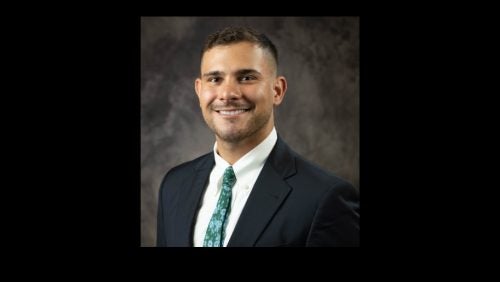My Clinic Win: Advocating for Asylum Seekers with the Center for Applied Legal Studies
March 20, 2025

Rodrigo Bermudez, L’24, participated in the Center for Applied Legal Studies (CALS) during the fall 2023 semester.
Having immigrated to the United States from Colombia, where his family fled political persecution, Rodrigo Bermudez, L’24, came to Georgetown Law knowing the stakes of immigration law and the asylum process firsthand.
During his 3L year, Bermudez participated in the Center for Applied Legal Studies (CALS), in which students represent individuals seeking asylum. “For people like our client, who was politically outspoken against his repressive government, there is no alternative to asylum,” he says. “Returning to his home country means death. That’s the reality of immigration law.”
Here, Bermudez reflects on his clinic experience, including what it was like to represent a client in detention, how he and his clinic partner approached building their case and the clinical skills that he uses in his current role as a litigation associate.
“Coming into law school, I was always aware that CALS existed, but taking an immigration law and policy class with Professor from Practice Andrew Schoenholtz, who co-directs the clinic, solidified my decision to apply. I wanted to gain a deeper understanding of immigration law and policy through direct client representation.
My clinic partner, Madeline Sachs, L’25, and I volunteered to take on a case where our client was being held in a detention facility in Virginia. Within a week of the start of the semester, we were on Zoom in front of a immigration judge to ask for an individual asylum hearing date, which was set for November.
In school, you’re used to being given a set of facts and then analyzing them and applying the law. But in a case like this, the facts are not given to you — you have to develop them from scratch. During our first visit to the detention facility, we started talking to our client about his case. He is from Nicaragua, where he was really politically active and had started taking part in anti-government protests. Ultimately, that made him a target of political persecution, including monitoring by pro-government forces and, eventually, violent physical assaults.
In building our case, we worked with outside experts to demonstrate that our client experienced PTSD and trauma as a result of what he endured in his home country. We collaborated with a social worker, who produced a psychological evaluation, and a country conditions expert, who wrote a report on Nicaragua, and incorporated their findings into our legal arguments.
We also wrote an affidavit from our client’s perspective and on behalf of the friends and family members we interviewed. Helping to gather and edit the expert reports, along with writing the affidavits, motions and our legal brief, really helped me develop my writing skills — something I draw on all the time in my current work as a litigation associate. The rigorous editing process was also invaluable. We received feedback on everything we wrote from our CALS teaching fellows and also circulated our brief among our classmates, whose review helped strengthen our arguments.

Rodrigo Bermudez (left), L’24, and Madeline Sachs (center), L’25, celebrated with their client (right) after picking him up from the facility where he was detained.
To prepare for the trial, Madeline and I discussed every aspect of the hearing, for example, who was going to do the opening argument? Who was going to talk to the judge? Where were we going to sit? We also did a lot of witness preparation with our client to prepare him for questioning by the government, including hosting a mock trial in the detention center with help from the CALS fellows.
On the day of the hearing, I was prepared to deliver our closing argument, which I had practiced and mooted for hours — but I never got the chance. Midway through the hearing, after our client’s cross-examination, Madeline and I asked for a break to confer before my closing. After the break, the judge returned and said that she was granting asylum in the case.
The next day, Madeline and I drove to the detention center to pick our client up. When we walked out the front door, he fell to his knees and started crying. He hadn’t been free for six months. We got to do that for him — all because of the clinic. It was not only the outcome that we wanted and worked so hard for, but the right outcome: the process played out on the side of justice. I’m proud to have been a part of that.
Georgetown Law offers the country’s largest and most highly regarded clinical education program: Every year, more than 300 students participate in our 17 different clinics. Under the supervision of faculty and fellows, they have the opportunity to engage in real-life lawyering. In this series, students share their “clinic wins” — the large and small accomplishments that came through their clinic experiences.